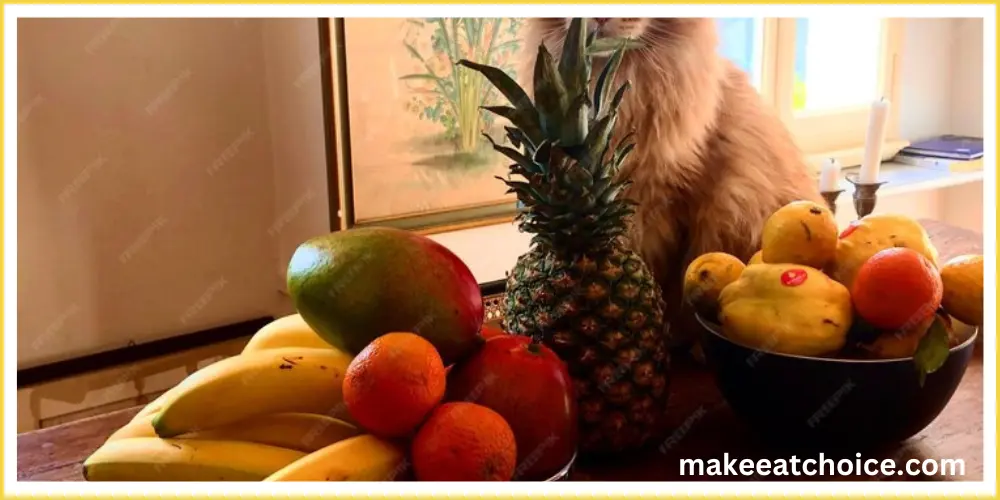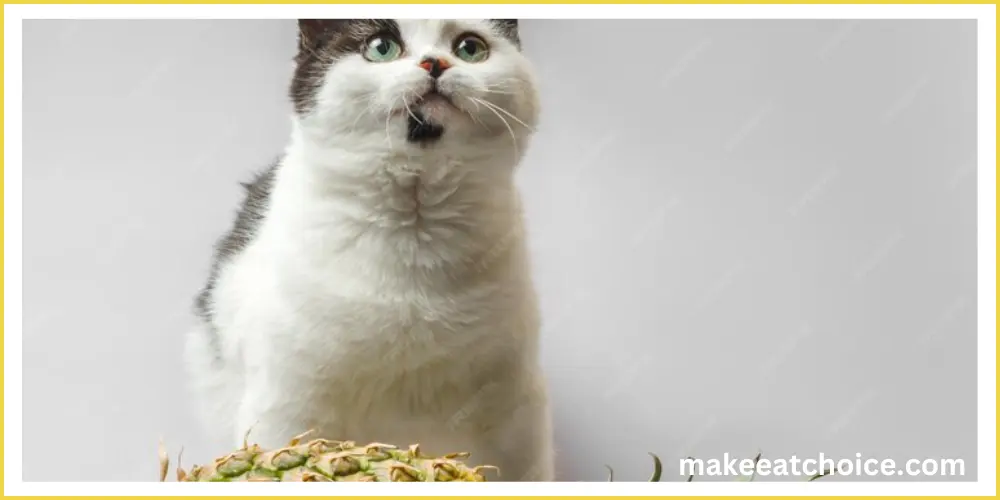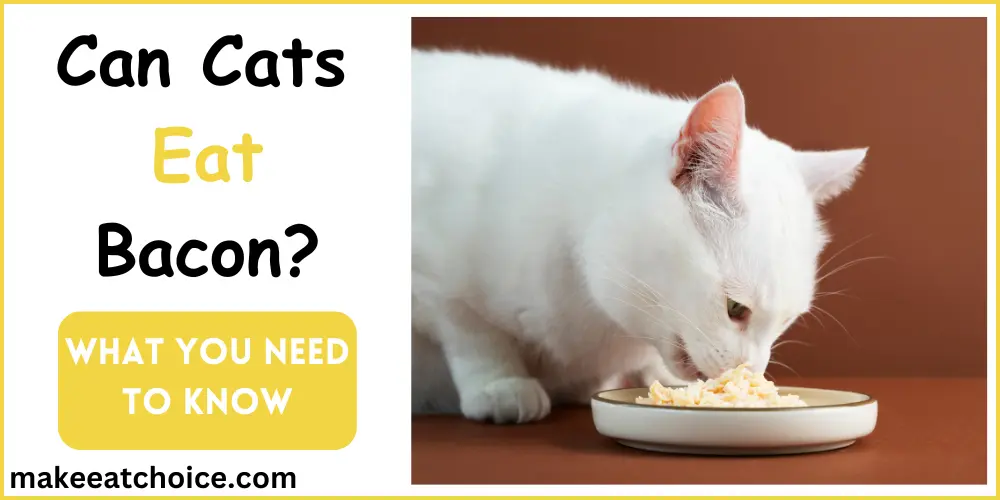
Every dietary choice in the labyrinthine world of feline nutrition is accompanied by a set of “should” and “should not” considerations. Nevertheless, pineapple? Is that tangy, sweet treat that humans revere safe for our purring companions to consume in small amounts?
This all-encompassing manual analyses the pineapple problem to assist cat owners and health-conscious consumers. Can cats eat pineapple? We will delve into the complexities of feline digestion, weigh the pros and cons of pineapple consumption, and provide cautionary anecdotes regarding feeding this fruit to your feline companion.
Can Cats Eat Pineapple?
With moderation, cats can eat pineapple, but owners should exercise caution. While not poisonous, the fructose in pineapple can upset some cats’ stomachs, particularly those already prone to vomiting and diarrhea.
It is recommended to offer small amounts sparingly. Pineapples are a good source of vitamins and nutrients for cats, especially when given in moderate amounts. Pineapples are a good source of manganese, which is good for a cat’s health in general.
But keep an eye on your cat’s reaction to pineapple and take it to the clinic if it gets sick. Cats have specific dietary needs; therefore, pineapple should not be a regular part of their food but rather an occasional treat.
Ensure your feline friend is healthy by slowly giving them new foods and watching how they react.
Are Pineapples Safe for Cats?
Is pineapple immediately dangerous for cats? That’s the first thing that comes to mind for many cat owners. The fruit itself is not poisonous to cats, which is excellent news. They have nutrients that are good for people’s health and have the same positive effects on cats’ health. Vitamin C, abundant in pineapples, is essential for healthy immunological function. They are a good source of fibre, which can make digestion easier.
Problems arise when cats’ digestive systems handle the fruit and not because of the fruit itself. Because they are obligate carnivores, cats can’t get the protein they need from plants. Felines do not typically eat plant-based foods; therefore, their digestive systems aren’t prepared to process them. When fed in moderation, pineapple is usually delicate for cats, but too much or under particular circumstances can make it sour.

Are Pineapples Good for Cats?
Yes, when used moderately. Pineapples are a great source of the health-promoting enzyme bromelain, which also has anti-inflammatory effects. But bromelain isn’t present in fresh pineapples in very high concentrations, and it is cooked out when pineapples are canned or cooked. A cat’s health can benefit from pineapples because they are rich in vitamin C and fibre.
The amount of vitamin C that should be consumed in feline nutrition is debatable. Although cats are capable of making their vitamin C, it could be helpful to give them more when they’re sick or under stress. However, cats rarely require dietary supplements because a well-balanced diet of animal proteins provides all the necessary nutrients.
When is Pineapple Bad for Cats?
Some felines might prefer something other than pineapple. This tropical fruit has a lot of sugar, which could make some cats sick, particularly diabetic cats or cats with sensitive stomachs. If your cat already has gastrointestinal troubles, pineapple acidity can make them even worse.
An increasing number of cats are being diagnosed with diabetes, and it’s worth noting that pineapple, despite being natural, may contain sugar that cats with this disease should avoid. Furthermore, cats should not eat acidic fruits like pineapple if they have pancreatitis, IBS, or a history of UTIs.
Do Cats Actually Like Pineapple?
A sneer and a swat are expected outcomes of the well-known cat-and-fruit confrontation. Pineapples are famous for their sweetness, but cats—obligate carnivores—are infamously picky about their food. Cats, though, are one-of-a-kind. The combination of pineapple’s sweetness and tanginess may be irresistible to some, but it may make others gag.
To help your cat adjust to the texture and flavour of pineapple—even if it’s just for a fun sniff or lick—you can introduce it with familiar meals. Cats tend to dislike new and strange things.
Can I Give My Cat Pineapple?
A small piece of ripe pineapple here and there won’t hurt your cat; if it’s a healthy eater, it might even help them. It is essential to start with tiny quantities when introducing new foods to a cat’s diet. Pay close attention to the cat’s actions and any symptoms of illness, like diarrhea or vomiting. Avoid canned or tinned pineapple if you own a cat. Not only is the sugary syrup terrible for cats, but the processing also removes most of the nutritional value.

What Fruits Can Cats Eat?
While cats are not known for their love of fruits and vegetables, there are a few that they can enjoy in moderation. These include:
- Apples: Cats can munch on a small piece, seedless and skinless.
- Bananas: A small, ripe banana can be a safe and tasty treat.
- Blueberries: These can act as low-calorie, high-antioxidant snacks for cats.
- Cantaloupe: Cats can have a small amount of this melon as well.
Remember, all these fruits should be consumed in moderation, and cats should consume a primarily meat-based diet.
Related:
FAQs
Are Pineapples Toxic to Cats?
Although pineapples do not have toxic properties in and of themselves, their elevated sugar and acidity levels may pose health risks to certain felines, particularly those with certain medical conditions.
What Fruit Can Cats Not Eat?
Grapes and raisins are known to be highly toxic to cats and should be avoided at all costs.
Can My Cat Drink Pineapple Juice?
Due to its extremely high sugar content, pineapple juice should be avoided. Due to the high sugar content, gastrointestinal distress and other health complications may result.
Can Cats Eat Mango?
Mango is not toxic to cats and can be relished as a treat in minute quantities; however, it should be administered with extreme caution.
Can Cats Lick Pineapple?
Cats can lick pineapple, but that does not mean they ought to. Occasionally, giving your cat a small sample is acceptable, but keep an eye out for any adverse effects.
Why is My Cat Obsessed With Pineapple?
Due to the inquisitive nature of cats, their fixation on novel objects is occasionally a trivial novelty. Cats may be intrigued by the aroma, texture, or flavour of pineapple, and they may attempt to investigate by touching, licking, or even consuming it, just as they appear to be mesmerized by numerous inedible domestic items.
Conclusion:
Although pineapple is technically edible for cats, it should be reserved for special occasions and consumed in moderation. Can cats eat pineapple? Pineapple, which is acidic and rich in natural carbohydrates, may cause digestive distress in cats if consumed in excess or if the cat is susceptible. Remember that a healthy cat should consume only high-quality, meat-based cat food.
Before introducing new foods or drastically altering your cat’s diet, consult your veterinarian, particularly if your cat has underlying health conditions. Because every cat is distinct, what is acceptable for one may not be for another. Regardless of your cat’s preference for pineapple, you must ensure that any treats you give them are safe and nutritious.
Cat owners strive to ensure that their pets live joyful, healthy lives; proper nutrition is essential to cat care. Maintain the affection and care you show your feline companions, and watch what you put into their furry stomachs.
References:
- By Dr. Rebecca MacMillan, Can Cats Eat Pineapple? Posted On Apr 27, 2022.
- By Danielle Petch, Can cats eat pineapple? Posted On 25 November 2022.



